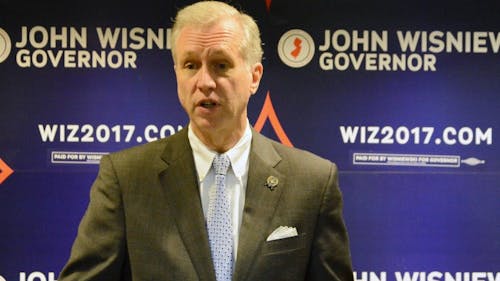During education town hall, Gov. candidate John Wisniewski pledges to ensure student joins Rutgers Board of Governors

As governor, Assemblyman John Wisniewski (D-19) would support a student voting member on Rutgers' Board of Governors.
If it becomes too difficult to change state law dictating who can become a voting member, he would appoint a student to fill an existing spot on the board, he said during a town hall meeting on education Sunday night in the Douglass Student Center.
“I’d like to change the law, but I also recognize that there’s a very complicated formula between the number of governors and trustees,” he said. “If we can’t do that, if we can’t get the law changed to create a student member on the Board of Governors, then I would take one of my appointments as governor to make sure we had a student representative.”
The assemblyman laid out his views on education in New Jersey, and said that the Garden State does not currently fund its public schools at the levels it should.
“We have not funded to the point where this year, we’re underfunding (public education) by $1.6 billion,” he said. “That is a travesty, not only for all of our children who go to public schools but for the teachers and those who pay property taxes which go up.”
Higher education also needs to be reformed, particularly with state or other public institutions, Wisniewski said. College students should not be required to take on debt in order to graduate, nor should they be prevented from trying to study a field they are genuinely interested in.
“The economics are different today,” he said. “There are young men and women not just in New Brunswick but across the country and across the state saddled with student debts, and what do they do? Their first obligation is not whether they can follow their career goals related to their major, their first goal is ‘I have student loans due in six months and I need to find a job.’”
Wisniewski proposed offering free tuition to students whose families have a combined income of $125,000 or less if they attend a public university or college in New Jersey.
He also suggested ways of helping primary and secondary public schools in the state.
Forced statewide exams prevent teachers from properly educating their students, Wisniewski said.
“We have a phenomenon occurring right now where we have so many teachers teaching their students not to enrich their minds and learn, but to pass the (Partnership for Assessment of Readiness for College and Careers) PARCC test,” he said. “The PARCC test is one of those which came out of the education community but has become a drain and a source of frustration for many families.”
He promised to halt the PARCC if he is elected, but said school districts which invested funds into equipment needed to take the exam — the test is online and required some schools to purchase laptops or other computers to allow every student to take it — would not recoup their investment.
Wisniewski said he wants schools to take advantage of computers and other modern technology in the classrooms as well.
Not just public education, but also charter schools need to be reformed so that they are helping students rather than draining resources, he said. In particular, he pledged to put a moratorium on charter schools until local school districts can decide how to work with them.
At present, if a student goes to a charter school, the charter school receives tax funding rather than the public school district, Wisniewski said. He would rather see local school districts receive the funding as well as direct how much funds charter schools in their area can receive.
“I don’t see that there’s any added advantage to having the state dictate to the local districts, we’ve seen the outcome when the state dictates what the schools should do,” he said. “If we go the route of no more charters, what has to be done, that has to be done at the local level.”
Schools also need to invest more in instructors, not just textbooks or facilities, Wisniewski said. School districts are not able to properly take care of teachers, at least in part due to funding difficulties and issues with their pension plan.
Fixing the pension plan could take decades, and may require a constitutional amendment to ensure the state can consistently pay for it, he said.
Wisniewski also wants to ensure that teachers are trained adequately. In response to a question about students who could not properly write or communicate, he said he would like to see education in general improve.
“Communication is so important, fundamentally once you’re done with your education one of the things you need to have to succeed in our economy and society is the ability to communicate and we don’t always see that,” he said.
Nikhilesh De is a correspondent for The Daily Targum. He is a School of Arts and Sciences senior. Follow him on Twitter @nikhileshde for more.



